Hospitality Management Research Trends
VerifiedAdded on 2020/01/07
|14
|5108
|193
Essay
AI Summary
This assignment delves into contemporary research trends within the field of hospitality management. It examines various aspects, including popular pricing techniques, the influence of transformative leadership on employee creativity, and challenges facing human capital development in the hotel industry, particularly in Nigeria. The analysis draws upon a selection of academic articles and online resources to highlight key findings and areas for future exploration.
Contribute Materials
Your contribution can guide someone’s learning journey. Share your
documents today.
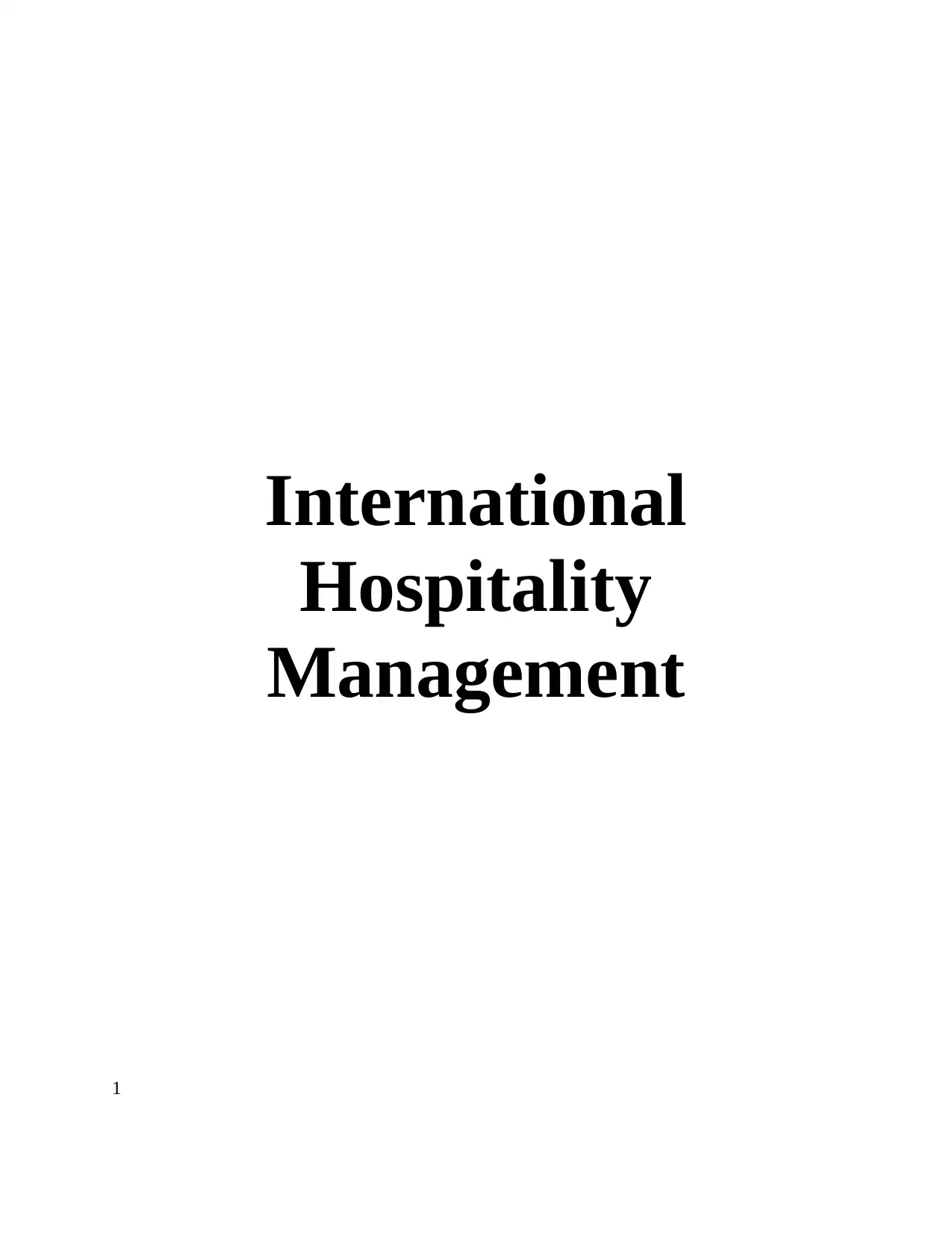
International
Hospitality
Management
1
Hospitality
Management
1
Secure Best Marks with AI Grader
Need help grading? Try our AI Grader for instant feedback on your assignments.
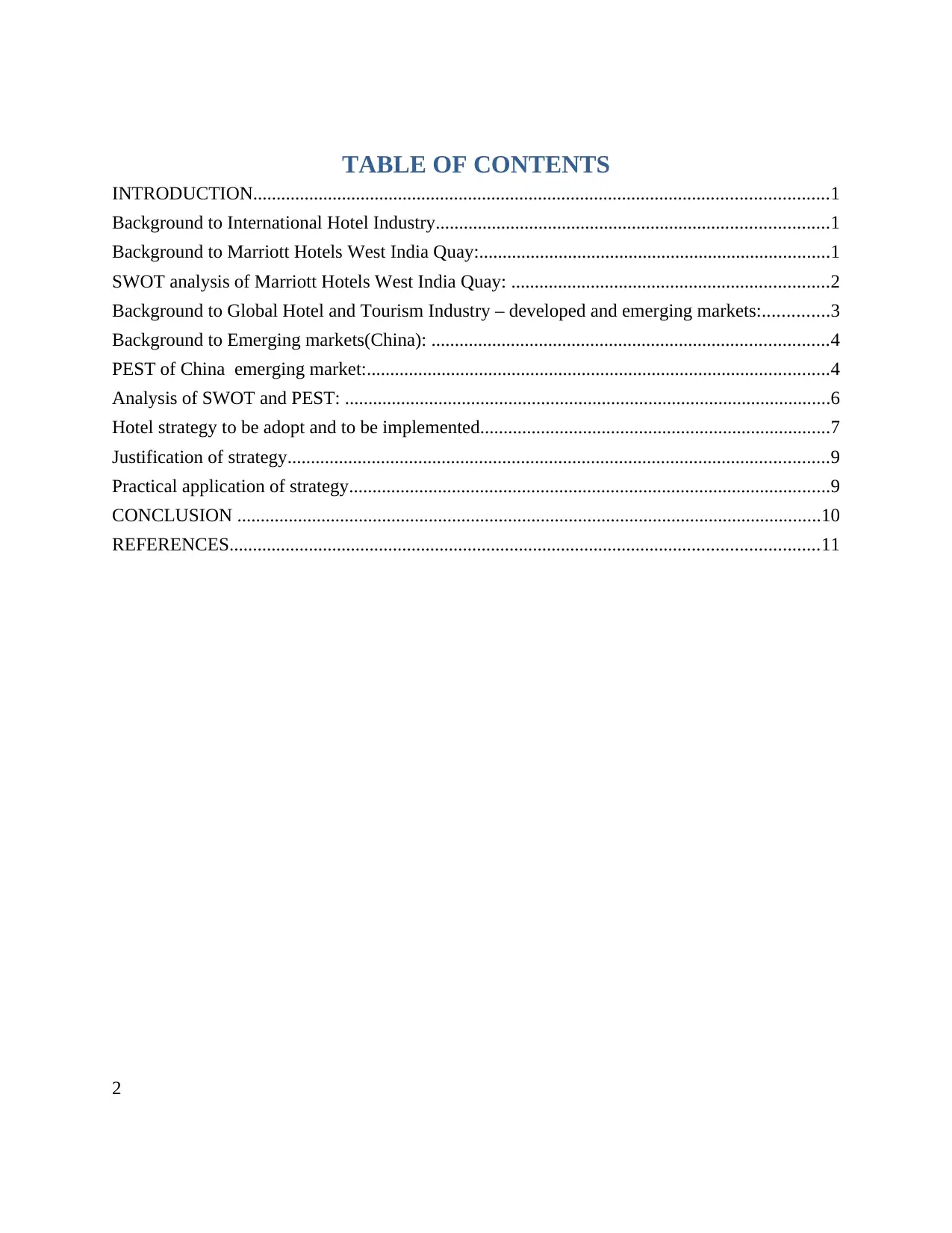
TABLE OF CONTENTS
INTRODUCTION...........................................................................................................................1
Background to International Hotel Industry....................................................................................1
Background to Marriott Hotels West India Quay:...........................................................................1
SWOT analysis of Marriott Hotels West India Quay: ....................................................................2
Background to Global Hotel and Tourism Industry – developed and emerging markets:..............3
Background to Emerging markets(China): .....................................................................................4
PEST of China emerging market:...................................................................................................4
Analysis of SWOT and PEST: ........................................................................................................6
Hotel strategy to be adopt and to be implemented...........................................................................7
Justification of strategy....................................................................................................................9
Practical application of strategy.......................................................................................................9
CONCLUSION .............................................................................................................................10
REFERENCES..............................................................................................................................11
2
INTRODUCTION...........................................................................................................................1
Background to International Hotel Industry....................................................................................1
Background to Marriott Hotels West India Quay:...........................................................................1
SWOT analysis of Marriott Hotels West India Quay: ....................................................................2
Background to Global Hotel and Tourism Industry – developed and emerging markets:..............3
Background to Emerging markets(China): .....................................................................................4
PEST of China emerging market:...................................................................................................4
Analysis of SWOT and PEST: ........................................................................................................6
Hotel strategy to be adopt and to be implemented...........................................................................7
Justification of strategy....................................................................................................................9
Practical application of strategy.......................................................................................................9
CONCLUSION .............................................................................................................................10
REFERENCES..............................................................................................................................11
2
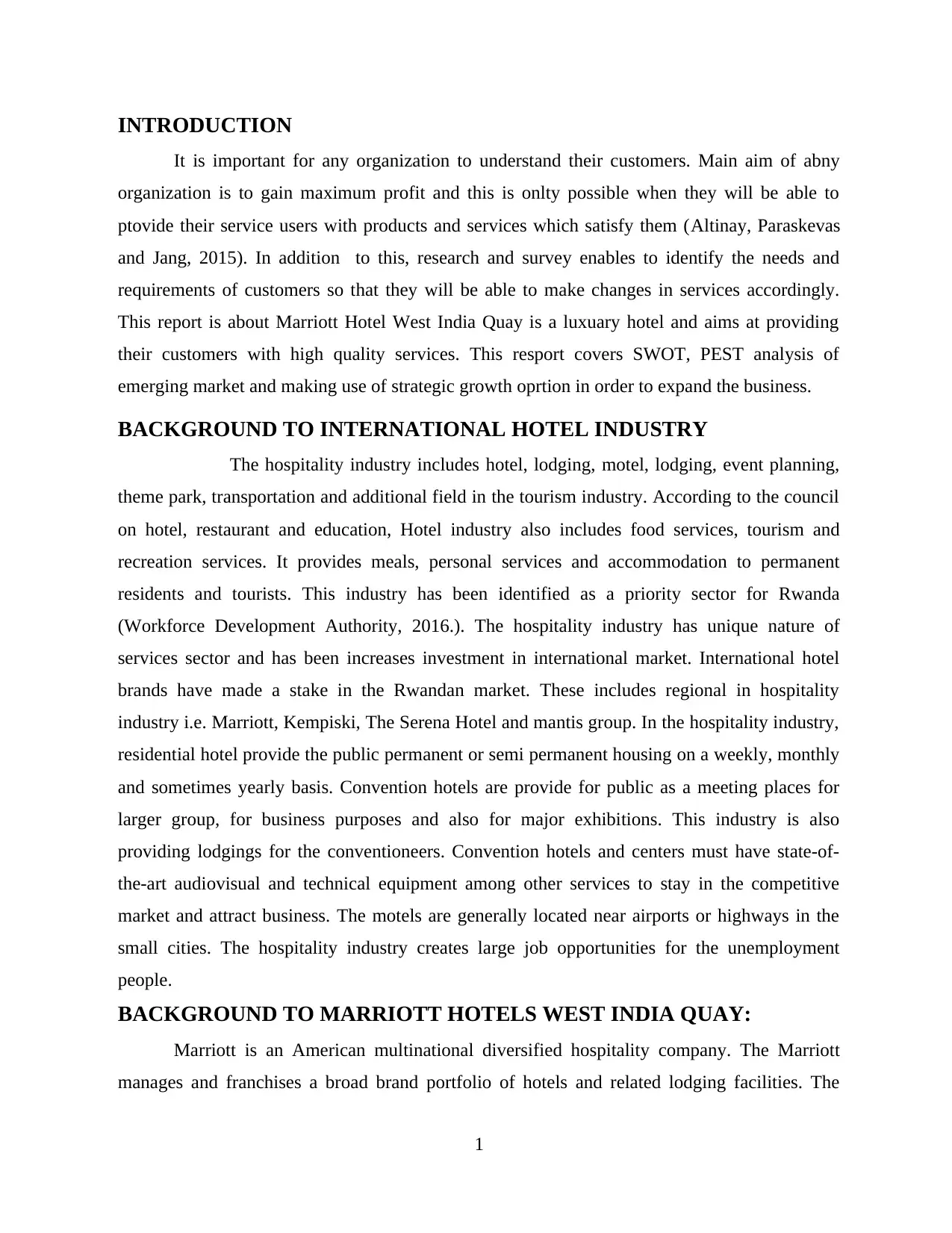
INTRODUCTION
It is important for any organization to understand their customers. Main aim of abny
organization is to gain maximum profit and this is onlty possible when they will be able to
ptovide their service users with products and services which satisfy them (Altinay, Paraskevas
and Jang, 2015). In addition to this, research and survey enables to identify the needs and
requirements of customers so that they will be able to make changes in services accordingly.
This report is about Marriott Hotel West India Quay is a luxuary hotel and aims at providing
their customers with high quality services. This resport covers SWOT, PEST analysis of
emerging market and making use of strategic growth oprtion in order to expand the business.
BACKGROUND TO INTERNATIONAL HOTEL INDUSTRY
The hospitality industry includes hotel, lodging, motel, lodging, event planning,
theme park, transportation and additional field in the tourism industry. According to the council
on hotel, restaurant and education, Hotel industry also includes food services, tourism and
recreation services. It provides meals, personal services and accommodation to permanent
residents and tourists. This industry has been identified as a priority sector for Rwanda
(Workforce Development Authority, 2016.). The hospitality industry has unique nature of
services sector and has been increases investment in international market. International hotel
brands have made a stake in the Rwandan market. These includes regional in hospitality
industry i.e. Marriott, Kempiski, The Serena Hotel and mantis group. In the hospitality industry,
residential hotel provide the public permanent or semi permanent housing on a weekly, monthly
and sometimes yearly basis. Convention hotels are provide for public as a meeting places for
larger group, for business purposes and also for major exhibitions. This industry is also
providing lodgings for the conventioneers. Convention hotels and centers must have state-of-
the-art audiovisual and technical equipment among other services to stay in the competitive
market and attract business. The motels are generally located near airports or highways in the
small cities. The hospitality industry creates large job opportunities for the unemployment
people.
BACKGROUND TO MARRIOTT HOTELS WEST INDIA QUAY:
Marriott is an American multinational diversified hospitality company. The Marriott
manages and franchises a broad brand portfolio of hotels and related lodging facilities. The
1
It is important for any organization to understand their customers. Main aim of abny
organization is to gain maximum profit and this is onlty possible when they will be able to
ptovide their service users with products and services which satisfy them (Altinay, Paraskevas
and Jang, 2015). In addition to this, research and survey enables to identify the needs and
requirements of customers so that they will be able to make changes in services accordingly.
This report is about Marriott Hotel West India Quay is a luxuary hotel and aims at providing
their customers with high quality services. This resport covers SWOT, PEST analysis of
emerging market and making use of strategic growth oprtion in order to expand the business.
BACKGROUND TO INTERNATIONAL HOTEL INDUSTRY
The hospitality industry includes hotel, lodging, motel, lodging, event planning,
theme park, transportation and additional field in the tourism industry. According to the council
on hotel, restaurant and education, Hotel industry also includes food services, tourism and
recreation services. It provides meals, personal services and accommodation to permanent
residents and tourists. This industry has been identified as a priority sector for Rwanda
(Workforce Development Authority, 2016.). The hospitality industry has unique nature of
services sector and has been increases investment in international market. International hotel
brands have made a stake in the Rwandan market. These includes regional in hospitality
industry i.e. Marriott, Kempiski, The Serena Hotel and mantis group. In the hospitality industry,
residential hotel provide the public permanent or semi permanent housing on a weekly, monthly
and sometimes yearly basis. Convention hotels are provide for public as a meeting places for
larger group, for business purposes and also for major exhibitions. This industry is also
providing lodgings for the conventioneers. Convention hotels and centers must have state-of-
the-art audiovisual and technical equipment among other services to stay in the competitive
market and attract business. The motels are generally located near airports or highways in the
small cities. The hospitality industry creates large job opportunities for the unemployment
people.
BACKGROUND TO MARRIOTT HOTELS WEST INDIA QUAY:
Marriott is an American multinational diversified hospitality company. The Marriott
manages and franchises a broad brand portfolio of hotels and related lodging facilities. The
1
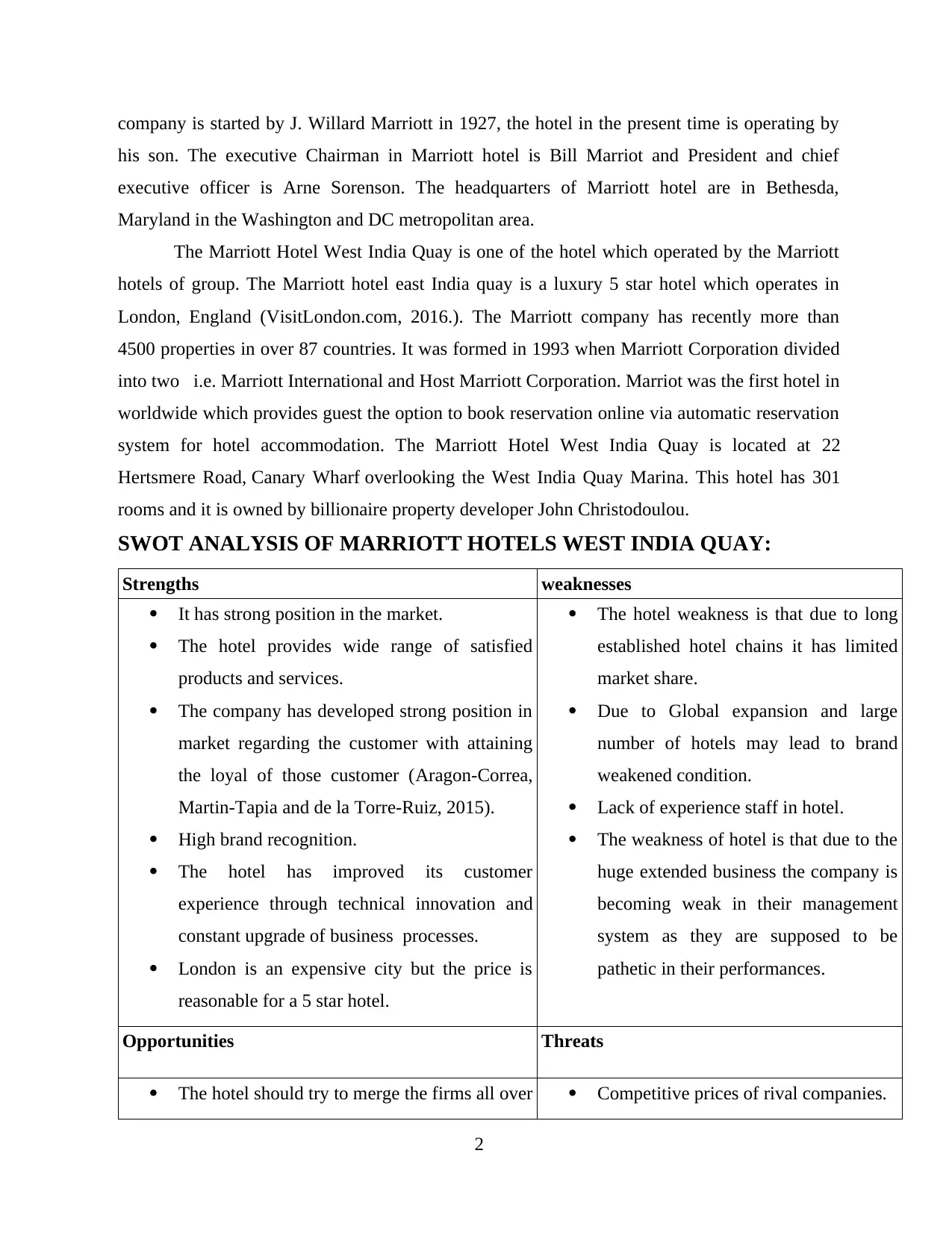
company is started by J. Willard Marriott in 1927, the hotel in the present time is operating by
his son. The executive Chairman in Marriott hotel is Bill Marriot and President and chief
executive officer is Arne Sorenson. The headquarters of Marriott hotel are in Bethesda,
Maryland in the Washington and DC metropolitan area.
The Marriott Hotel West India Quay is one of the hotel which operated by the Marriott
hotels of group. The Marriott hotel east India quay is a luxury 5 star hotel which operates in
London, England (VisitLondon.com, 2016.). The Marriott company has recently more than
4500 properties in over 87 countries. It was formed in 1993 when Marriott Corporation divided
into two i.e. Marriott International and Host Marriott Corporation. Marriot was the first hotel in
worldwide which provides guest the option to book reservation online via automatic reservation
system for hotel accommodation. The Marriott Hotel West India Quay is located at 22
Hertsmere Road, Canary Wharf overlooking the West India Quay Marina. This hotel has 301
rooms and it is owned by billionaire property developer John Christodoulou.
SWOT ANALYSIS OF MARRIOTT HOTELS WEST INDIA QUAY:
Strengths weaknesses
It has strong position in the market.
The hotel provides wide range of satisfied
products and services.
The company has developed strong position in
market regarding the customer with attaining
the loyal of those customer (Aragon-Correa,
Martin-Tapia and de la Torre-Ruiz, 2015).
High brand recognition.
The hotel has improved its customer
experience through technical innovation and
constant upgrade of business processes.
London is an expensive city but the price is
reasonable for a 5 star hotel.
The hotel weakness is that due to long
established hotel chains it has limited
market share.
Due to Global expansion and large
number of hotels may lead to brand
weakened condition.
Lack of experience staff in hotel.
The weakness of hotel is that due to the
huge extended business the company is
becoming weak in their management
system as they are supposed to be
pathetic in their performances.
Opportunities Threats
The hotel should try to merge the firms all over Competitive prices of rival companies.
2
his son. The executive Chairman in Marriott hotel is Bill Marriot and President and chief
executive officer is Arne Sorenson. The headquarters of Marriott hotel are in Bethesda,
Maryland in the Washington and DC metropolitan area.
The Marriott Hotel West India Quay is one of the hotel which operated by the Marriott
hotels of group. The Marriott hotel east India quay is a luxury 5 star hotel which operates in
London, England (VisitLondon.com, 2016.). The Marriott company has recently more than
4500 properties in over 87 countries. It was formed in 1993 when Marriott Corporation divided
into two i.e. Marriott International and Host Marriott Corporation. Marriot was the first hotel in
worldwide which provides guest the option to book reservation online via automatic reservation
system for hotel accommodation. The Marriott Hotel West India Quay is located at 22
Hertsmere Road, Canary Wharf overlooking the West India Quay Marina. This hotel has 301
rooms and it is owned by billionaire property developer John Christodoulou.
SWOT ANALYSIS OF MARRIOTT HOTELS WEST INDIA QUAY:
Strengths weaknesses
It has strong position in the market.
The hotel provides wide range of satisfied
products and services.
The company has developed strong position in
market regarding the customer with attaining
the loyal of those customer (Aragon-Correa,
Martin-Tapia and de la Torre-Ruiz, 2015).
High brand recognition.
The hotel has improved its customer
experience through technical innovation and
constant upgrade of business processes.
London is an expensive city but the price is
reasonable for a 5 star hotel.
The hotel weakness is that due to long
established hotel chains it has limited
market share.
Due to Global expansion and large
number of hotels may lead to brand
weakened condition.
Lack of experience staff in hotel.
The weakness of hotel is that due to the
huge extended business the company is
becoming weak in their management
system as they are supposed to be
pathetic in their performances.
Opportunities Threats
The hotel should try to merge the firms all over Competitive prices of rival companies.
2
Secure Best Marks with AI Grader
Need help grading? Try our AI Grader for instant feedback on your assignments.
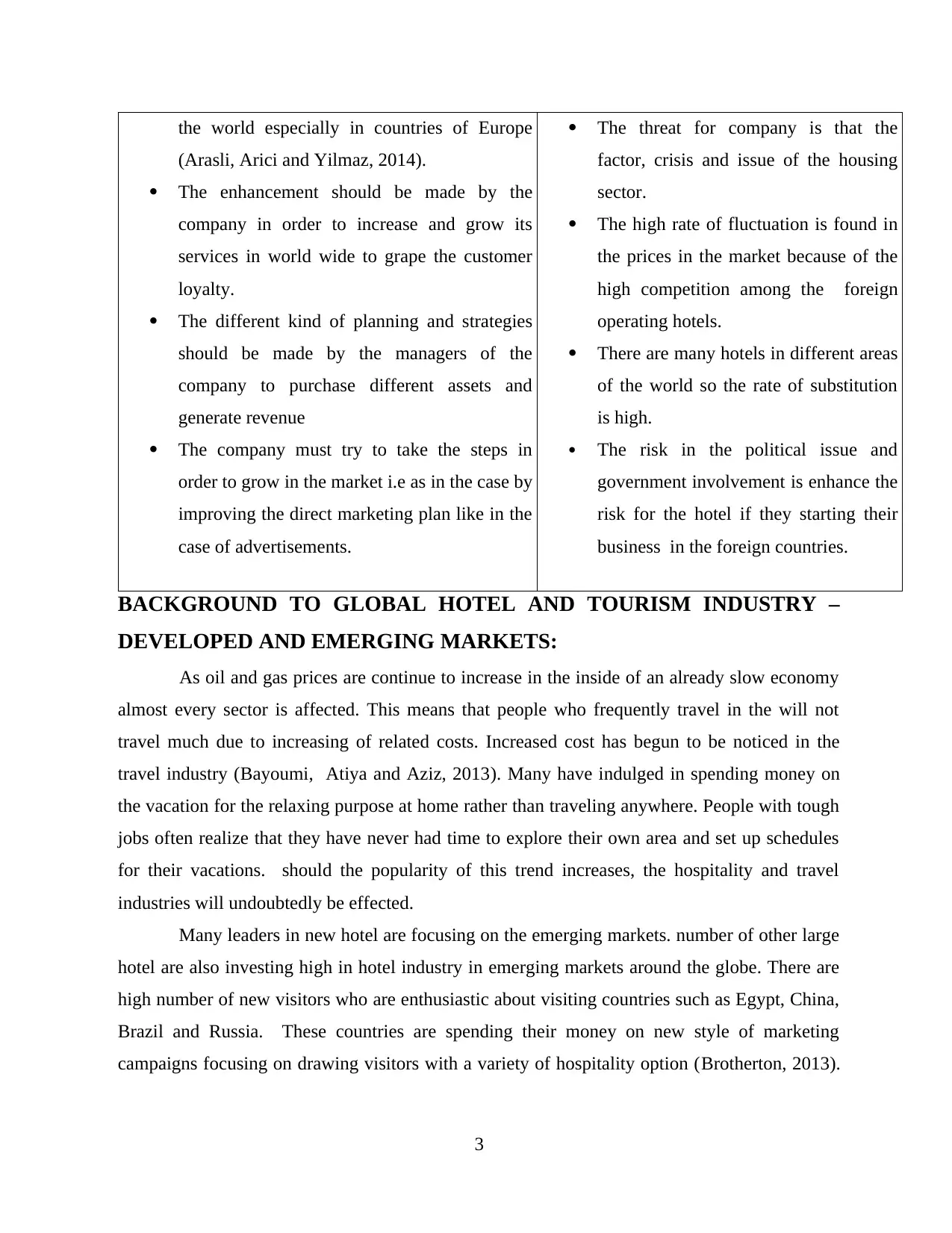
the world especially in countries of Europe
(Arasli, Arici and Yilmaz, 2014).
The enhancement should be made by the
company in order to increase and grow its
services in world wide to grape the customer
loyalty.
The different kind of planning and strategies
should be made by the managers of the
company to purchase different assets and
generate revenue
The company must try to take the steps in
order to grow in the market i.e as in the case by
improving the direct marketing plan like in the
case of advertisements.
The threat for company is that the
factor, crisis and issue of the housing
sector.
The high rate of fluctuation is found in
the prices in the market because of the
high competition among the foreign
operating hotels.
There are many hotels in different areas
of the world so the rate of substitution
is high.
The risk in the political issue and
government involvement is enhance the
risk for the hotel if they starting their
business in the foreign countries.
BACKGROUND TO GLOBAL HOTEL AND TOURISM INDUSTRY –
DEVELOPED AND EMERGING MARKETS:
As oil and gas prices are continue to increase in the inside of an already slow economy
almost every sector is affected. This means that people who frequently travel in the will not
travel much due to increasing of related costs. Increased cost has begun to be noticed in the
travel industry (Bayoumi, Atiya and Aziz, 2013). Many have indulged in spending money on
the vacation for the relaxing purpose at home rather than traveling anywhere. People with tough
jobs often realize that they have never had time to explore their own area and set up schedules
for their vacations. should the popularity of this trend increases, the hospitality and travel
industries will undoubtedly be effected.
Many leaders in new hotel are focusing on the emerging markets. number of other large
hotel are also investing high in hotel industry in emerging markets around the globe. There are
high number of new visitors who are enthusiastic about visiting countries such as Egypt, China,
Brazil and Russia. These countries are spending their money on new style of marketing
campaigns focusing on drawing visitors with a variety of hospitality option (Brotherton, 2013).
3
(Arasli, Arici and Yilmaz, 2014).
The enhancement should be made by the
company in order to increase and grow its
services in world wide to grape the customer
loyalty.
The different kind of planning and strategies
should be made by the managers of the
company to purchase different assets and
generate revenue
The company must try to take the steps in
order to grow in the market i.e as in the case by
improving the direct marketing plan like in the
case of advertisements.
The threat for company is that the
factor, crisis and issue of the housing
sector.
The high rate of fluctuation is found in
the prices in the market because of the
high competition among the foreign
operating hotels.
There are many hotels in different areas
of the world so the rate of substitution
is high.
The risk in the political issue and
government involvement is enhance the
risk for the hotel if they starting their
business in the foreign countries.
BACKGROUND TO GLOBAL HOTEL AND TOURISM INDUSTRY –
DEVELOPED AND EMERGING MARKETS:
As oil and gas prices are continue to increase in the inside of an already slow economy
almost every sector is affected. This means that people who frequently travel in the will not
travel much due to increasing of related costs. Increased cost has begun to be noticed in the
travel industry (Bayoumi, Atiya and Aziz, 2013). Many have indulged in spending money on
the vacation for the relaxing purpose at home rather than traveling anywhere. People with tough
jobs often realize that they have never had time to explore their own area and set up schedules
for their vacations. should the popularity of this trend increases, the hospitality and travel
industries will undoubtedly be effected.
Many leaders in new hotel are focusing on the emerging markets. number of other large
hotel are also investing high in hotel industry in emerging markets around the globe. There are
high number of new visitors who are enthusiastic about visiting countries such as Egypt, China,
Brazil and Russia. These countries are spending their money on new style of marketing
campaigns focusing on drawing visitors with a variety of hospitality option (Brotherton, 2013).
3
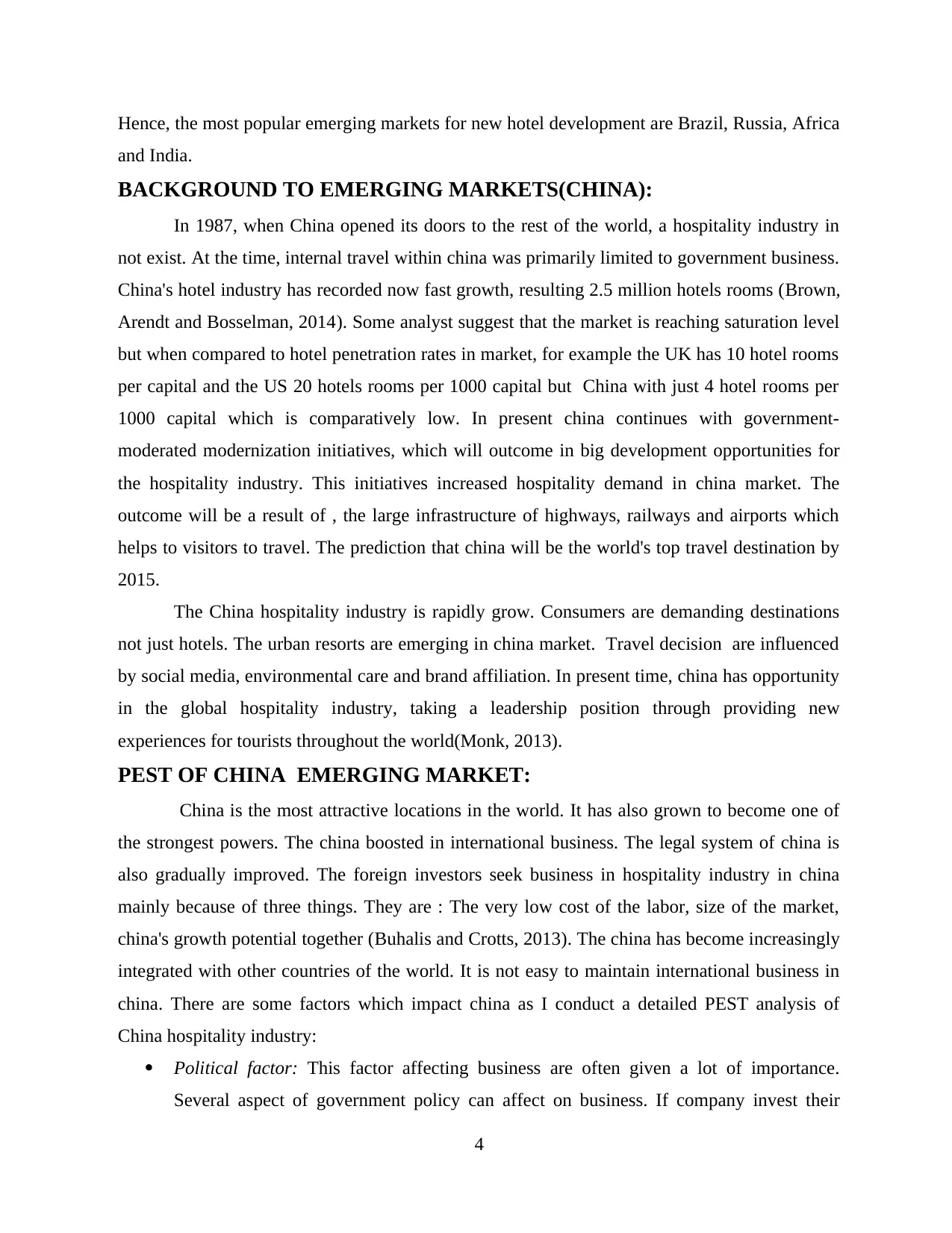
Hence, the most popular emerging markets for new hotel development are Brazil, Russia, Africa
and India.
BACKGROUND TO EMERGING MARKETS(CHINA):
In 1987, when China opened its doors to the rest of the world, a hospitality industry in
not exist. At the time, internal travel within china was primarily limited to government business.
China's hotel industry has recorded now fast growth, resulting 2.5 million hotels rooms (Brown,
Arendt and Bosselman, 2014). Some analyst suggest that the market is reaching saturation level
but when compared to hotel penetration rates in market, for example the UK has 10 hotel rooms
per capital and the US 20 hotels rooms per 1000 capital but China with just 4 hotel rooms per
1000 capital which is comparatively low. In present china continues with government-
moderated modernization initiatives, which will outcome in big development opportunities for
the hospitality industry. This initiatives increased hospitality demand in china market. The
outcome will be a result of , the large infrastructure of highways, railways and airports which
helps to visitors to travel. The prediction that china will be the world's top travel destination by
2015.
The China hospitality industry is rapidly grow. Consumers are demanding destinations
not just hotels. The urban resorts are emerging in china market. Travel decision are influenced
by social media, environmental care and brand affiliation. In present time, china has opportunity
in the global hospitality industry, taking a leadership position through providing new
experiences for tourists throughout the world(Monk, 2013).
PEST OF CHINA EMERGING MARKET:
China is the most attractive locations in the world. It has also grown to become one of
the strongest powers. The china boosted in international business. The legal system of china is
also gradually improved. The foreign investors seek business in hospitality industry in china
mainly because of three things. They are : The very low cost of the labor, size of the market,
china's growth potential together (Buhalis and Crotts, 2013). The china has become increasingly
integrated with other countries of the world. It is not easy to maintain international business in
china. There are some factors which impact china as I conduct a detailed PEST analysis of
China hospitality industry:
Political factor: This factor affecting business are often given a lot of importance.
Several aspect of government policy can affect on business. If company invest their
4
and India.
BACKGROUND TO EMERGING MARKETS(CHINA):
In 1987, when China opened its doors to the rest of the world, a hospitality industry in
not exist. At the time, internal travel within china was primarily limited to government business.
China's hotel industry has recorded now fast growth, resulting 2.5 million hotels rooms (Brown,
Arendt and Bosselman, 2014). Some analyst suggest that the market is reaching saturation level
but when compared to hotel penetration rates in market, for example the UK has 10 hotel rooms
per capital and the US 20 hotels rooms per 1000 capital but China with just 4 hotel rooms per
1000 capital which is comparatively low. In present china continues with government-
moderated modernization initiatives, which will outcome in big development opportunities for
the hospitality industry. This initiatives increased hospitality demand in china market. The
outcome will be a result of , the large infrastructure of highways, railways and airports which
helps to visitors to travel. The prediction that china will be the world's top travel destination by
2015.
The China hospitality industry is rapidly grow. Consumers are demanding destinations
not just hotels. The urban resorts are emerging in china market. Travel decision are influenced
by social media, environmental care and brand affiliation. In present time, china has opportunity
in the global hospitality industry, taking a leadership position through providing new
experiences for tourists throughout the world(Monk, 2013).
PEST OF CHINA EMERGING MARKET:
China is the most attractive locations in the world. It has also grown to become one of
the strongest powers. The china boosted in international business. The legal system of china is
also gradually improved. The foreign investors seek business in hospitality industry in china
mainly because of three things. They are : The very low cost of the labor, size of the market,
china's growth potential together (Buhalis and Crotts, 2013). The china has become increasingly
integrated with other countries of the world. It is not easy to maintain international business in
china. There are some factors which impact china as I conduct a detailed PEST analysis of
China hospitality industry:
Political factor: This factor affecting business are often given a lot of importance.
Several aspect of government policy can affect on business. If company invest their
4
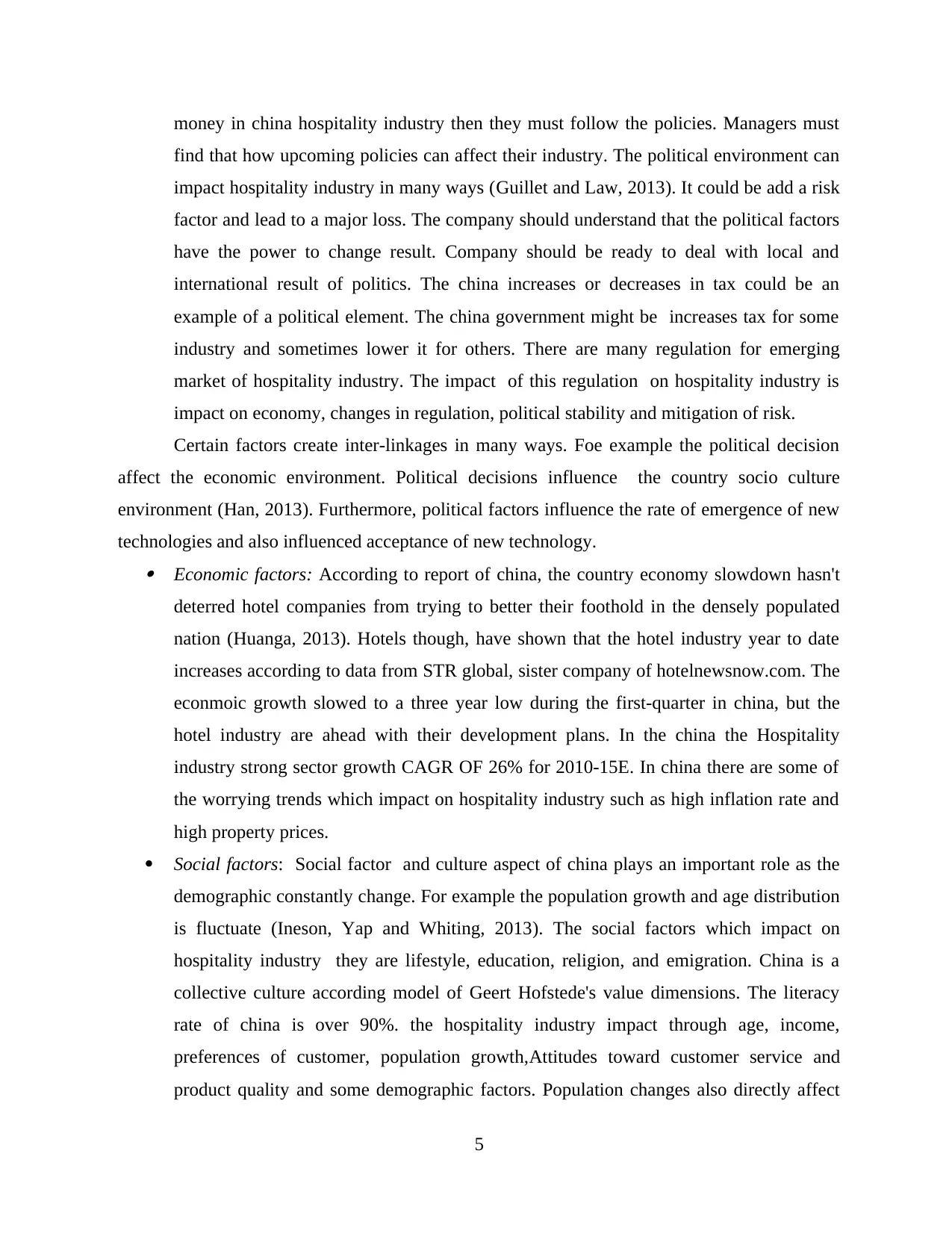
money in china hospitality industry then they must follow the policies. Managers must
find that how upcoming policies can affect their industry. The political environment can
impact hospitality industry in many ways (Guillet and Law, 2013). It could be add a risk
factor and lead to a major loss. The company should understand that the political factors
have the power to change result. Company should be ready to deal with local and
international result of politics. The china increases or decreases in tax could be an
example of a political element. The china government might be increases tax for some
industry and sometimes lower it for others. There are many regulation for emerging
market of hospitality industry. The impact of this regulation on hospitality industry is
impact on economy, changes in regulation, political stability and mitigation of risk.
Certain factors create inter-linkages in many ways. Foe example the political decision
affect the economic environment. Political decisions influence the country socio culture
environment (Han, 2013). Furthermore, political factors influence the rate of emergence of new
technologies and also influenced acceptance of new technology. Economic factors: According to report of china, the country economy slowdown hasn't
deterred hotel companies from trying to better their foothold in the densely populated
nation (Huanga, 2013). Hotels though, have shown that the hotel industry year to date
increases according to data from STR global, sister company of hotelnewsnow.com. The
econmoic growth slowed to a three year low during the first-quarter in china, but the
hotel industry are ahead with their development plans. In the china the Hospitality
industry strong sector growth CAGR OF 26% for 2010-15E. In china there are some of
the worrying trends which impact on hospitality industry such as high inflation rate and
high property prices.
Social factors: Social factor and culture aspect of china plays an important role as the
demographic constantly change. For example the population growth and age distribution
is fluctuate (Ineson, Yap and Whiting, 2013). The social factors which impact on
hospitality industry they are lifestyle, education, religion, and emigration. China is a
collective culture according model of Geert Hofstede's value dimensions. The literacy
rate of china is over 90%. the hospitality industry impact through age, income,
preferences of customer, population growth,Attitudes toward customer service and
product quality and some demographic factors. Population changes also directly affect
5
find that how upcoming policies can affect their industry. The political environment can
impact hospitality industry in many ways (Guillet and Law, 2013). It could be add a risk
factor and lead to a major loss. The company should understand that the political factors
have the power to change result. Company should be ready to deal with local and
international result of politics. The china increases or decreases in tax could be an
example of a political element. The china government might be increases tax for some
industry and sometimes lower it for others. There are many regulation for emerging
market of hospitality industry. The impact of this regulation on hospitality industry is
impact on economy, changes in regulation, political stability and mitigation of risk.
Certain factors create inter-linkages in many ways. Foe example the political decision
affect the economic environment. Political decisions influence the country socio culture
environment (Han, 2013). Furthermore, political factors influence the rate of emergence of new
technologies and also influenced acceptance of new technology. Economic factors: According to report of china, the country economy slowdown hasn't
deterred hotel companies from trying to better their foothold in the densely populated
nation (Huanga, 2013). Hotels though, have shown that the hotel industry year to date
increases according to data from STR global, sister company of hotelnewsnow.com. The
econmoic growth slowed to a three year low during the first-quarter in china, but the
hotel industry are ahead with their development plans. In the china the Hospitality
industry strong sector growth CAGR OF 26% for 2010-15E. In china there are some of
the worrying trends which impact on hospitality industry such as high inflation rate and
high property prices.
Social factors: Social factor and culture aspect of china plays an important role as the
demographic constantly change. For example the population growth and age distribution
is fluctuate (Ineson, Yap and Whiting, 2013). The social factors which impact on
hospitality industry they are lifestyle, education, religion, and emigration. China is a
collective culture according model of Geert Hofstede's value dimensions. The literacy
rate of china is over 90%. the hospitality industry impact through age, income,
preferences of customer, population growth,Attitudes toward customer service and
product quality and some demographic factors. Population changes also directly affect
5
Paraphrase This Document
Need a fresh take? Get an instant paraphrase of this document with our AI Paraphraser
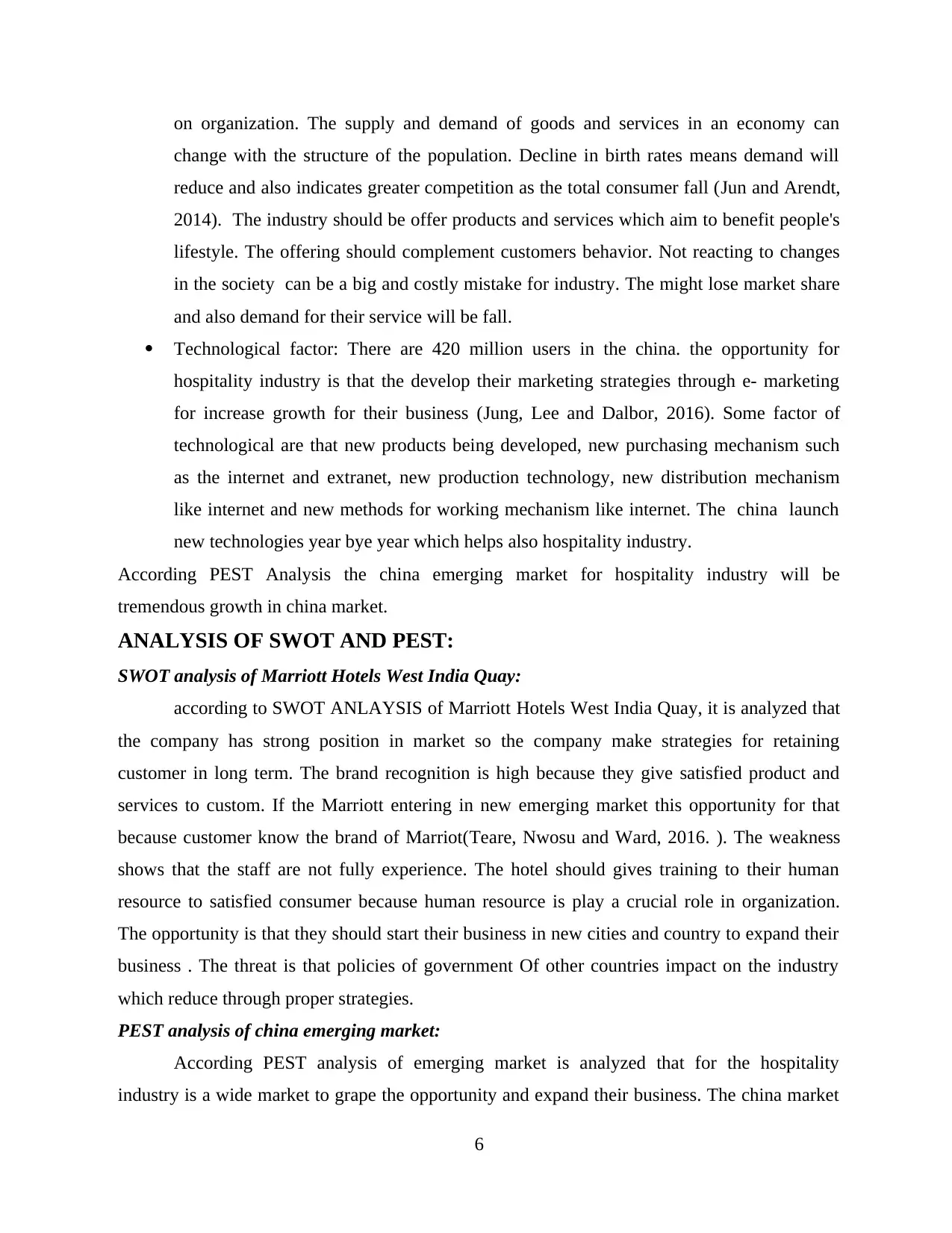
on organization. The supply and demand of goods and services in an economy can
change with the structure of the population. Decline in birth rates means demand will
reduce and also indicates greater competition as the total consumer fall (Jun and Arendt,
2014). The industry should be offer products and services which aim to benefit people's
lifestyle. The offering should complement customers behavior. Not reacting to changes
in the society can be a big and costly mistake for industry. The might lose market share
and also demand for their service will be fall.
Technological factor: There are 420 million users in the china. the opportunity for
hospitality industry is that the develop their marketing strategies through e- marketing
for increase growth for their business (Jung, Lee and Dalbor, 2016). Some factor of
technological are that new products being developed, new purchasing mechanism such
as the internet and extranet, new production technology, new distribution mechanism
like internet and new methods for working mechanism like internet. The china launch
new technologies year bye year which helps also hospitality industry.
According PEST Analysis the china emerging market for hospitality industry will be
tremendous growth in china market.
ANALYSIS OF SWOT AND PEST:
SWOT analysis of Marriott Hotels West India Quay:
according to SWOT ANLAYSIS of Marriott Hotels West India Quay, it is analyzed that
the company has strong position in market so the company make strategies for retaining
customer in long term. The brand recognition is high because they give satisfied product and
services to custom. If the Marriott entering in new emerging market this opportunity for that
because customer know the brand of Marriot(Teare, Nwosu and Ward, 2016. ). The weakness
shows that the staff are not fully experience. The hotel should gives training to their human
resource to satisfied consumer because human resource is play a crucial role in organization.
The opportunity is that they should start their business in new cities and country to expand their
business . The threat is that policies of government Of other countries impact on the industry
which reduce through proper strategies.
PEST analysis of china emerging market:
According PEST analysis of emerging market is analyzed that for the hospitality
industry is a wide market to grape the opportunity and expand their business. The china market
6
change with the structure of the population. Decline in birth rates means demand will
reduce and also indicates greater competition as the total consumer fall (Jun and Arendt,
2014). The industry should be offer products and services which aim to benefit people's
lifestyle. The offering should complement customers behavior. Not reacting to changes
in the society can be a big and costly mistake for industry. The might lose market share
and also demand for their service will be fall.
Technological factor: There are 420 million users in the china. the opportunity for
hospitality industry is that the develop their marketing strategies through e- marketing
for increase growth for their business (Jung, Lee and Dalbor, 2016). Some factor of
technological are that new products being developed, new purchasing mechanism such
as the internet and extranet, new production technology, new distribution mechanism
like internet and new methods for working mechanism like internet. The china launch
new technologies year bye year which helps also hospitality industry.
According PEST Analysis the china emerging market for hospitality industry will be
tremendous growth in china market.
ANALYSIS OF SWOT AND PEST:
SWOT analysis of Marriott Hotels West India Quay:
according to SWOT ANLAYSIS of Marriott Hotels West India Quay, it is analyzed that
the company has strong position in market so the company make strategies for retaining
customer in long term. The brand recognition is high because they give satisfied product and
services to custom. If the Marriott entering in new emerging market this opportunity for that
because customer know the brand of Marriot(Teare, Nwosu and Ward, 2016. ). The weakness
shows that the staff are not fully experience. The hotel should gives training to their human
resource to satisfied consumer because human resource is play a crucial role in organization.
The opportunity is that they should start their business in new cities and country to expand their
business . The threat is that policies of government Of other countries impact on the industry
which reduce through proper strategies.
PEST analysis of china emerging market:
According PEST analysis of emerging market is analyzed that for the hospitality
industry is a wide market to grape the opportunity and expand their business. The china market
6
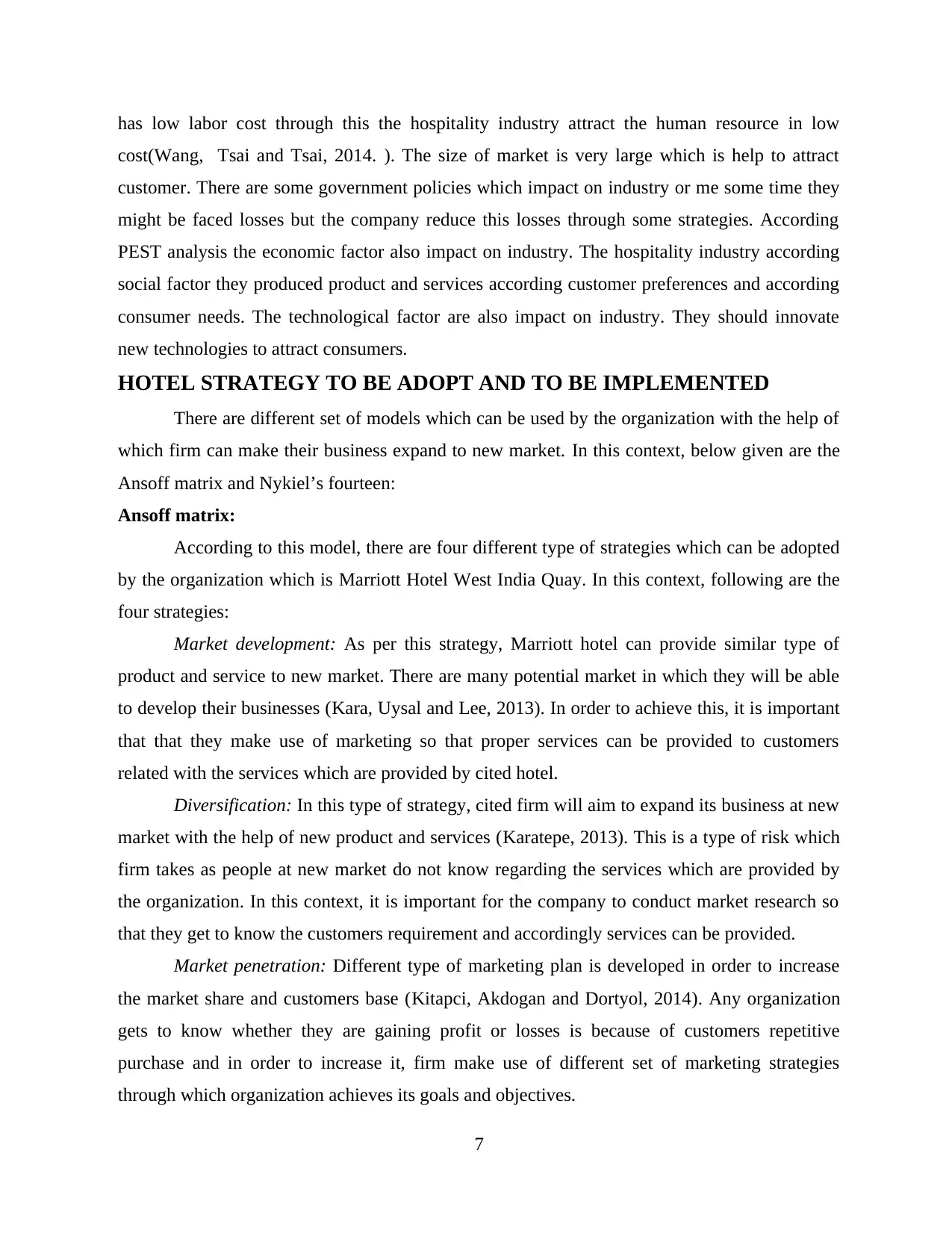
has low labor cost through this the hospitality industry attract the human resource in low
cost(Wang, Tsai and Tsai, 2014. ). The size of market is very large which is help to attract
customer. There are some government policies which impact on industry or me some time they
might be faced losses but the company reduce this losses through some strategies. According
PEST analysis the economic factor also impact on industry. The hospitality industry according
social factor they produced product and services according customer preferences and according
consumer needs. The technological factor are also impact on industry. They should innovate
new technologies to attract consumers.
HOTEL STRATEGY TO BE ADOPT AND TO BE IMPLEMENTED
There are different set of models which can be used by the organization with the help of
which firm can make their business expand to new market. In this context, below given are the
Ansoff matrix and Nykiel’s fourteen:
Ansoff matrix:
According to this model, there are four different type of strategies which can be adopted
by the organization which is Marriott Hotel West India Quay. In this context, following are the
four strategies:
Market development: As per this strategy, Marriott hotel can provide similar type of
product and service to new market. There are many potential market in which they will be able
to develop their businesses (Kara, Uysal and Lee, 2013). In order to achieve this, it is important
that that they make use of marketing so that proper services can be provided to customers
related with the services which are provided by cited hotel.
Diversification: In this type of strategy, cited firm will aim to expand its business at new
market with the help of new product and services (Karatepe, 2013). This is a type of risk which
firm takes as people at new market do not know regarding the services which are provided by
the organization. In this context, it is important for the company to conduct market research so
that they get to know the customers requirement and accordingly services can be provided.
Market penetration: Different type of marketing plan is developed in order to increase
the market share and customers base (Kitapci, Akdogan and Dortyol, 2014). Any organization
gets to know whether they are gaining profit or losses is because of customers repetitive
purchase and in order to increase it, firm make use of different set of marketing strategies
through which organization achieves its goals and objectives.
7
cost(Wang, Tsai and Tsai, 2014. ). The size of market is very large which is help to attract
customer. There are some government policies which impact on industry or me some time they
might be faced losses but the company reduce this losses through some strategies. According
PEST analysis the economic factor also impact on industry. The hospitality industry according
social factor they produced product and services according customer preferences and according
consumer needs. The technological factor are also impact on industry. They should innovate
new technologies to attract consumers.
HOTEL STRATEGY TO BE ADOPT AND TO BE IMPLEMENTED
There are different set of models which can be used by the organization with the help of
which firm can make their business expand to new market. In this context, below given are the
Ansoff matrix and Nykiel’s fourteen:
Ansoff matrix:
According to this model, there are four different type of strategies which can be adopted
by the organization which is Marriott Hotel West India Quay. In this context, following are the
four strategies:
Market development: As per this strategy, Marriott hotel can provide similar type of
product and service to new market. There are many potential market in which they will be able
to develop their businesses (Kara, Uysal and Lee, 2013). In order to achieve this, it is important
that that they make use of marketing so that proper services can be provided to customers
related with the services which are provided by cited hotel.
Diversification: In this type of strategy, cited firm will aim to expand its business at new
market with the help of new product and services (Karatepe, 2013). This is a type of risk which
firm takes as people at new market do not know regarding the services which are provided by
the organization. In this context, it is important for the company to conduct market research so
that they get to know the customers requirement and accordingly services can be provided.
Market penetration: Different type of marketing plan is developed in order to increase
the market share and customers base (Kitapci, Akdogan and Dortyol, 2014). Any organization
gets to know whether they are gaining profit or losses is because of customers repetitive
purchase and in order to increase it, firm make use of different set of marketing strategies
through which organization achieves its goals and objectives.
7
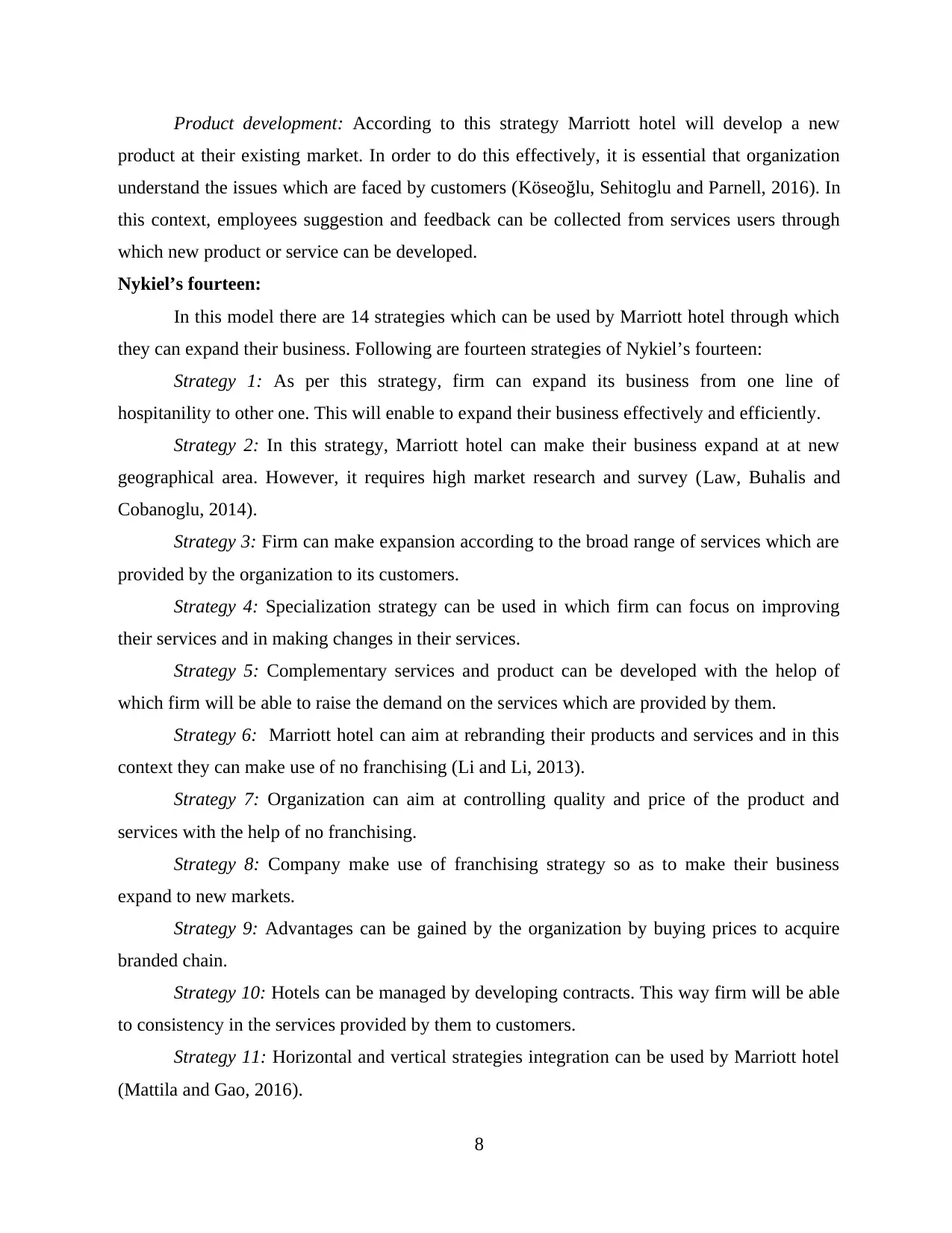
Product development: According to this strategy Marriott hotel will develop a new
product at their existing market. In order to do this effectively, it is essential that organization
understand the issues which are faced by customers (Köseoğlu, Sehitoglu and Parnell, 2016). In
this context, employees suggestion and feedback can be collected from services users through
which new product or service can be developed.
Nykiel’s fourteen:
In this model there are 14 strategies which can be used by Marriott hotel through which
they can expand their business. Following are fourteen strategies of Nykiel’s fourteen:
Strategy 1: As per this strategy, firm can expand its business from one line of
hospitanility to other one. This will enable to expand their business effectively and efficiently.
Strategy 2: In this strategy, Marriott hotel can make their business expand at at new
geographical area. However, it requires high market research and survey (Law, Buhalis and
Cobanoglu, 2014).
Strategy 3: Firm can make expansion according to the broad range of services which are
provided by the organization to its customers.
Strategy 4: Specialization strategy can be used in which firm can focus on improving
their services and in making changes in their services.
Strategy 5: Complementary services and product can be developed with the helop of
which firm will be able to raise the demand on the services which are provided by them.
Strategy 6: Marriott hotel can aim at rebranding their products and services and in this
context they can make use of no franchising (Li and Li, 2013).
Strategy 7: Organization can aim at controlling quality and price of the product and
services with the help of no franchising.
Strategy 8: Company make use of franchising strategy so as to make their business
expand to new markets.
Strategy 9: Advantages can be gained by the organization by buying prices to acquire
branded chain.
Strategy 10: Hotels can be managed by developing contracts. This way firm will be able
to consistency in the services provided by them to customers.
Strategy 11: Horizontal and vertical strategies integration can be used by Marriott hotel
(Mattila and Gao, 2016).
8
product at their existing market. In order to do this effectively, it is essential that organization
understand the issues which are faced by customers (Köseoğlu, Sehitoglu and Parnell, 2016). In
this context, employees suggestion and feedback can be collected from services users through
which new product or service can be developed.
Nykiel’s fourteen:
In this model there are 14 strategies which can be used by Marriott hotel through which
they can expand their business. Following are fourteen strategies of Nykiel’s fourteen:
Strategy 1: As per this strategy, firm can expand its business from one line of
hospitanility to other one. This will enable to expand their business effectively and efficiently.
Strategy 2: In this strategy, Marriott hotel can make their business expand at at new
geographical area. However, it requires high market research and survey (Law, Buhalis and
Cobanoglu, 2014).
Strategy 3: Firm can make expansion according to the broad range of services which are
provided by the organization to its customers.
Strategy 4: Specialization strategy can be used in which firm can focus on improving
their services and in making changes in their services.
Strategy 5: Complementary services and product can be developed with the helop of
which firm will be able to raise the demand on the services which are provided by them.
Strategy 6: Marriott hotel can aim at rebranding their products and services and in this
context they can make use of no franchising (Li and Li, 2013).
Strategy 7: Organization can aim at controlling quality and price of the product and
services with the help of no franchising.
Strategy 8: Company make use of franchising strategy so as to make their business
expand to new markets.
Strategy 9: Advantages can be gained by the organization by buying prices to acquire
branded chain.
Strategy 10: Hotels can be managed by developing contracts. This way firm will be able
to consistency in the services provided by them to customers.
Strategy 11: Horizontal and vertical strategies integration can be used by Marriott hotel
(Mattila and Gao, 2016).
8
Secure Best Marks with AI Grader
Need help grading? Try our AI Grader for instant feedback on your assignments.
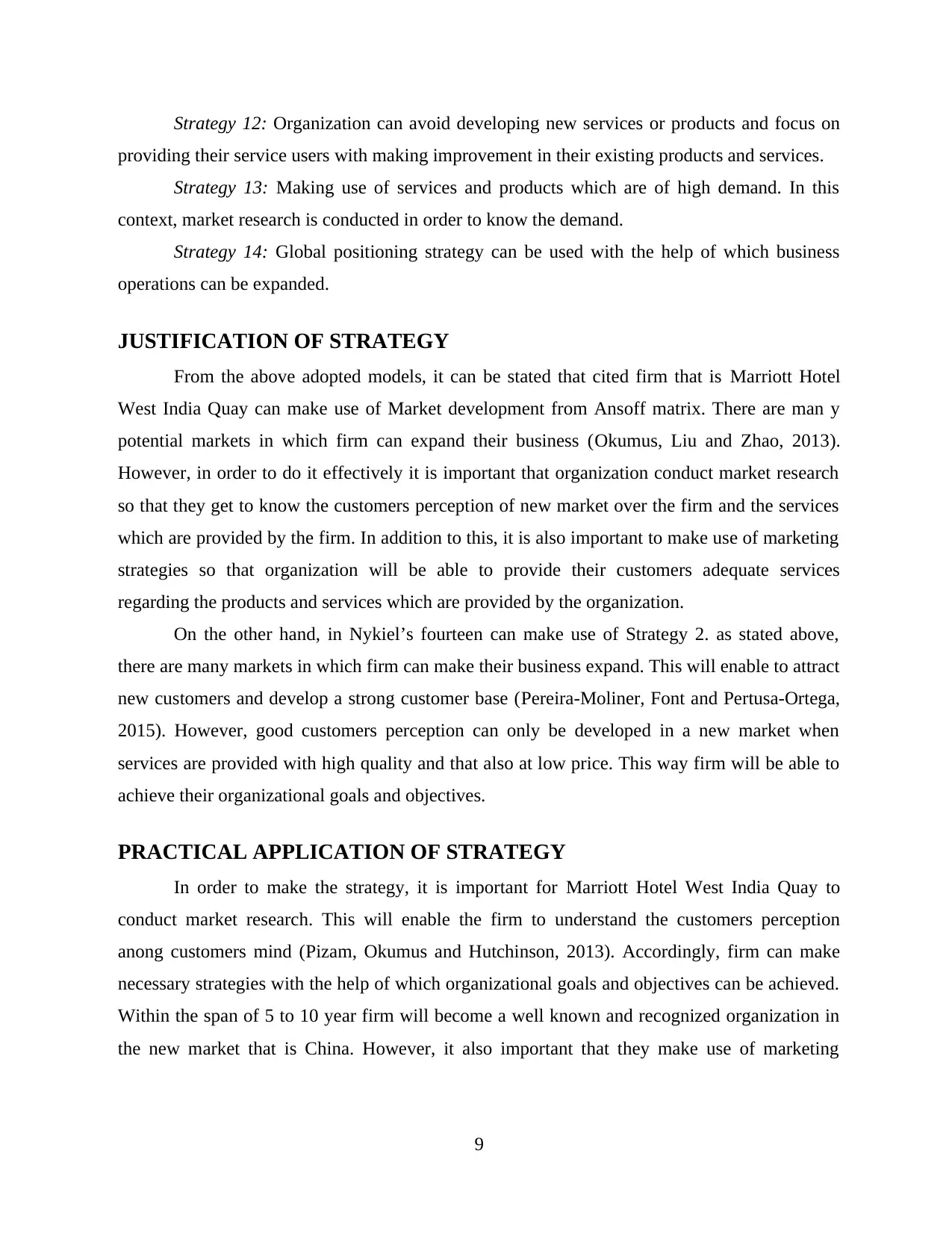
Strategy 12: Organization can avoid developing new services or products and focus on
providing their service users with making improvement in their existing products and services.
Strategy 13: Making use of services and products which are of high demand. In this
context, market research is conducted in order to know the demand.
Strategy 14: Global positioning strategy can be used with the help of which business
operations can be expanded.
JUSTIFICATION OF STRATEGY
From the above adopted models, it can be stated that cited firm that is Marriott Hotel
West India Quay can make use of Market development from Ansoff matrix. There are man y
potential markets in which firm can expand their business (Okumus, Liu and Zhao, 2013).
However, in order to do it effectively it is important that organization conduct market research
so that they get to know the customers perception of new market over the firm and the services
which are provided by the firm. In addition to this, it is also important to make use of marketing
strategies so that organization will be able to provide their customers adequate services
regarding the products and services which are provided by the organization.
On the other hand, in Nykiel’s fourteen can make use of Strategy 2. as stated above,
there are many markets in which firm can make their business expand. This will enable to attract
new customers and develop a strong customer base (Pereira-Moliner, Font and Pertusa-Ortega,
2015). However, good customers perception can only be developed in a new market when
services are provided with high quality and that also at low price. This way firm will be able to
achieve their organizational goals and objectives.
PRACTICAL APPLICATION OF STRATEGY
In order to make the strategy, it is important for Marriott Hotel West India Quay to
conduct market research. This will enable the firm to understand the customers perception
anong customers mind (Pizam, Okumus and Hutchinson, 2013). Accordingly, firm can make
necessary strategies with the help of which organizational goals and objectives can be achieved.
Within the span of 5 to 10 year firm will become a well known and recognized organization in
the new market that is China. However, it also important that they make use of marketing
9
providing their service users with making improvement in their existing products and services.
Strategy 13: Making use of services and products which are of high demand. In this
context, market research is conducted in order to know the demand.
Strategy 14: Global positioning strategy can be used with the help of which business
operations can be expanded.
JUSTIFICATION OF STRATEGY
From the above adopted models, it can be stated that cited firm that is Marriott Hotel
West India Quay can make use of Market development from Ansoff matrix. There are man y
potential markets in which firm can expand their business (Okumus, Liu and Zhao, 2013).
However, in order to do it effectively it is important that organization conduct market research
so that they get to know the customers perception of new market over the firm and the services
which are provided by the firm. In addition to this, it is also important to make use of marketing
strategies so that organization will be able to provide their customers adequate services
regarding the products and services which are provided by the organization.
On the other hand, in Nykiel’s fourteen can make use of Strategy 2. as stated above,
there are many markets in which firm can make their business expand. This will enable to attract
new customers and develop a strong customer base (Pereira-Moliner, Font and Pertusa-Ortega,
2015). However, good customers perception can only be developed in a new market when
services are provided with high quality and that also at low price. This way firm will be able to
achieve their organizational goals and objectives.
PRACTICAL APPLICATION OF STRATEGY
In order to make the strategy, it is important for Marriott Hotel West India Quay to
conduct market research. This will enable the firm to understand the customers perception
anong customers mind (Pizam, Okumus and Hutchinson, 2013). Accordingly, firm can make
necessary strategies with the help of which organizational goals and objectives can be achieved.
Within the span of 5 to 10 year firm will become a well known and recognized organization in
the new market that is China. However, it also important that they make use of marketing
9
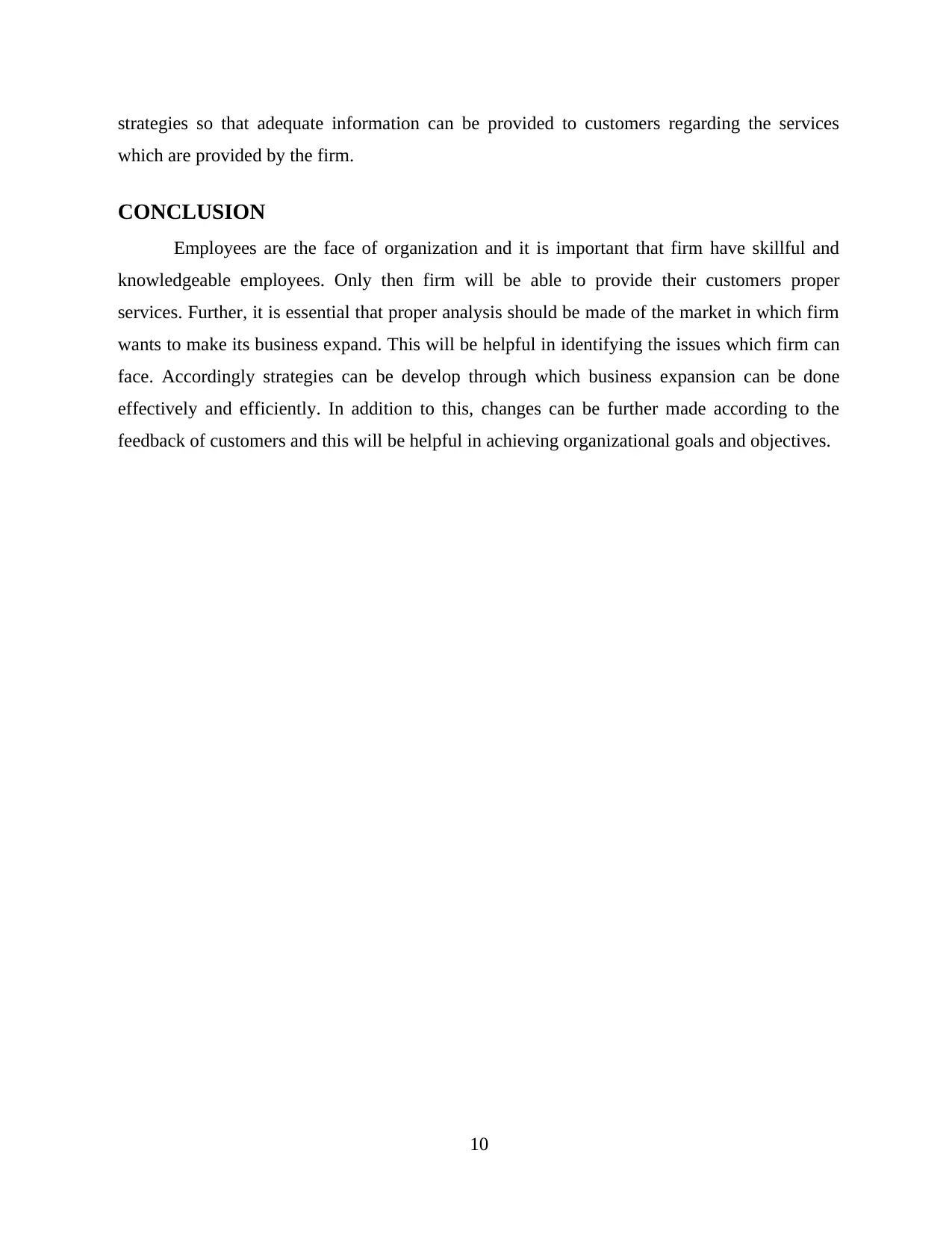
strategies so that adequate information can be provided to customers regarding the services
which are provided by the firm.
CONCLUSION
Employees are the face of organization and it is important that firm have skillful and
knowledgeable employees. Only then firm will be able to provide their customers proper
services. Further, it is essential that proper analysis should be made of the market in which firm
wants to make its business expand. This will be helpful in identifying the issues which firm can
face. Accordingly strategies can be develop through which business expansion can be done
effectively and efficiently. In addition to this, changes can be further made according to the
feedback of customers and this will be helpful in achieving organizational goals and objectives.
10
which are provided by the firm.
CONCLUSION
Employees are the face of organization and it is important that firm have skillful and
knowledgeable employees. Only then firm will be able to provide their customers proper
services. Further, it is essential that proper analysis should be made of the market in which firm
wants to make its business expand. This will be helpful in identifying the issues which firm can
face. Accordingly strategies can be develop through which business expansion can be done
effectively and efficiently. In addition to this, changes can be further made according to the
feedback of customers and this will be helpful in achieving organizational goals and objectives.
10
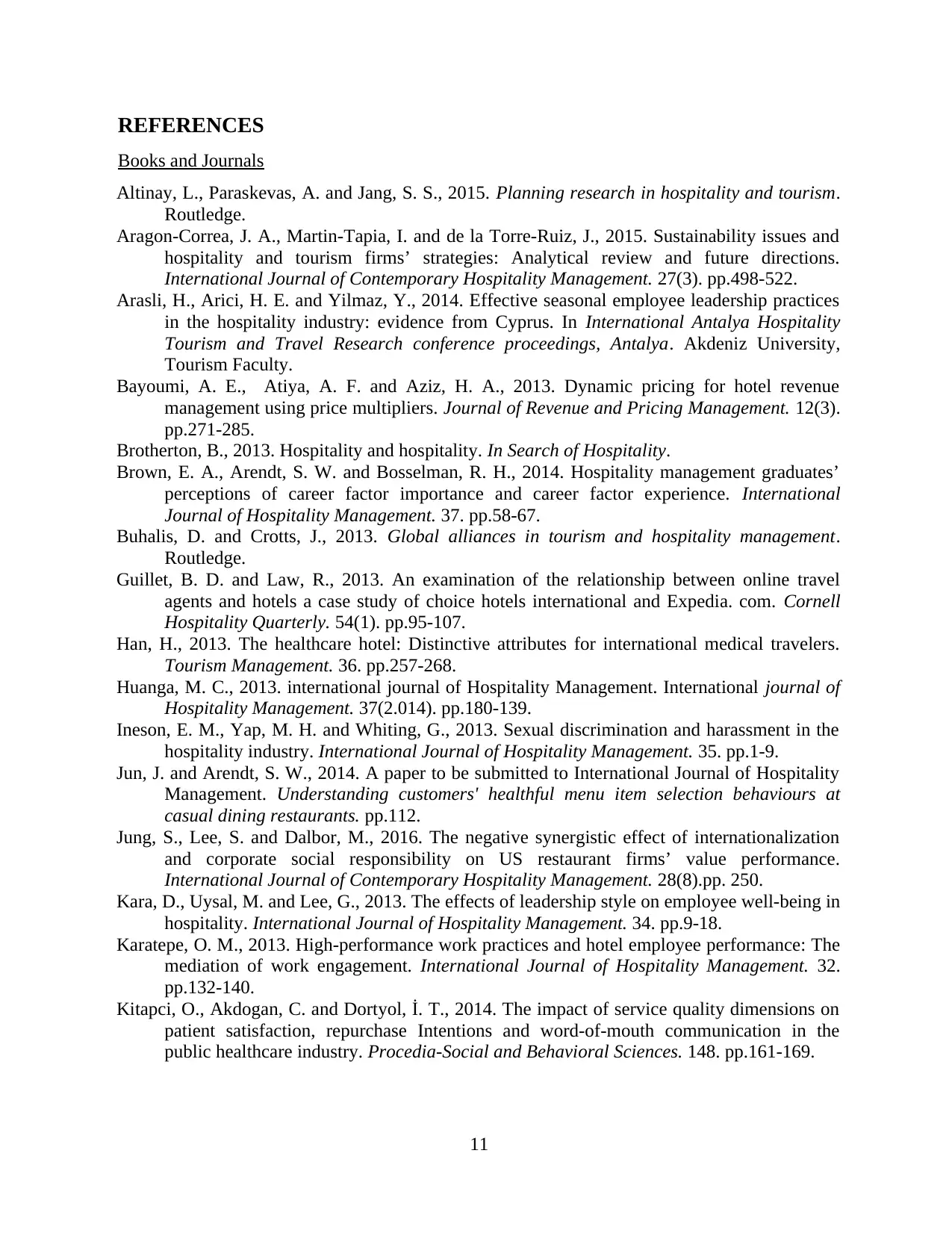
REFERENCES
Books and Journals
Altinay, L., Paraskevas, A. and Jang, S. S., 2015. Planning research in hospitality and tourism.
Routledge.
Aragon-Correa, J. A., Martin-Tapia, I. and de la Torre-Ruiz, J., 2015. Sustainability issues and
hospitality and tourism firms’ strategies: Analytical review and future directions.
International Journal of Contemporary Hospitality Management. 27(3). pp.498-522.
Arasli, H., Arici, H. E. and Yilmaz, Y., 2014. Effective seasonal employee leadership practices
in the hospitality industry: evidence from Cyprus. In International Antalya Hospitality
Tourism and Travel Research conference proceedings, Antalya. Akdeniz University,
Tourism Faculty.
Bayoumi, A. E., Atiya, A. F. and Aziz, H. A., 2013. Dynamic pricing for hotel revenue
management using price multipliers. Journal of Revenue and Pricing Management. 12(3).
pp.271-285.
Brotherton, B., 2013. Hospitality and hospitality. In Search of Hospitality.
Brown, E. A., Arendt, S. W. and Bosselman, R. H., 2014. Hospitality management graduates’
perceptions of career factor importance and career factor experience. International
Journal of Hospitality Management. 37. pp.58-67.
Buhalis, D. and Crotts, J., 2013. Global alliances in tourism and hospitality management.
Routledge.
Guillet, B. D. and Law, R., 2013. An examination of the relationship between online travel
agents and hotels a case study of choice hotels international and Expedia. com. Cornell
Hospitality Quarterly. 54(1). pp.95-107.
Han, H., 2013. The healthcare hotel: Distinctive attributes for international medical travelers.
Tourism Management. 36. pp.257-268.
Huanga, M. C., 2013. international journal of Hospitality Management. International journal of
Hospitality Management. 37(2.014). pp.180-139.
Ineson, E. M., Yap, M. H. and Whiting, G., 2013. Sexual discrimination and harassment in the
hospitality industry. International Journal of Hospitality Management. 35. pp.1-9.
Jun, J. and Arendt, S. W., 2014. A paper to be submitted to International Journal of Hospitality
Management. Understanding customers' healthful menu item selection behaviours at
casual dining restaurants. pp.112.
Jung, S., Lee, S. and Dalbor, M., 2016. The negative synergistic effect of internationalization
and corporate social responsibility on US restaurant firms’ value performance.
International Journal of Contemporary Hospitality Management. 28(8).pp. 250.
Kara, D., Uysal, M. and Lee, G., 2013. The effects of leadership style on employee well-being in
hospitality. International Journal of Hospitality Management. 34. pp.9-18.
Karatepe, O. M., 2013. High-performance work practices and hotel employee performance: The
mediation of work engagement. International Journal of Hospitality Management. 32.
pp.132-140.
Kitapci, O., Akdogan, C. and Dortyol, İ. T., 2014. The impact of service quality dimensions on
patient satisfaction, repurchase Intentions and word-of-mouth communication in the
public healthcare industry. Procedia-Social and Behavioral Sciences. 148. pp.161-169.
11
Books and Journals
Altinay, L., Paraskevas, A. and Jang, S. S., 2015. Planning research in hospitality and tourism.
Routledge.
Aragon-Correa, J. A., Martin-Tapia, I. and de la Torre-Ruiz, J., 2015. Sustainability issues and
hospitality and tourism firms’ strategies: Analytical review and future directions.
International Journal of Contemporary Hospitality Management. 27(3). pp.498-522.
Arasli, H., Arici, H. E. and Yilmaz, Y., 2014. Effective seasonal employee leadership practices
in the hospitality industry: evidence from Cyprus. In International Antalya Hospitality
Tourism and Travel Research conference proceedings, Antalya. Akdeniz University,
Tourism Faculty.
Bayoumi, A. E., Atiya, A. F. and Aziz, H. A., 2013. Dynamic pricing for hotel revenue
management using price multipliers. Journal of Revenue and Pricing Management. 12(3).
pp.271-285.
Brotherton, B., 2013. Hospitality and hospitality. In Search of Hospitality.
Brown, E. A., Arendt, S. W. and Bosselman, R. H., 2014. Hospitality management graduates’
perceptions of career factor importance and career factor experience. International
Journal of Hospitality Management. 37. pp.58-67.
Buhalis, D. and Crotts, J., 2013. Global alliances in tourism and hospitality management.
Routledge.
Guillet, B. D. and Law, R., 2013. An examination of the relationship between online travel
agents and hotels a case study of choice hotels international and Expedia. com. Cornell
Hospitality Quarterly. 54(1). pp.95-107.
Han, H., 2013. The healthcare hotel: Distinctive attributes for international medical travelers.
Tourism Management. 36. pp.257-268.
Huanga, M. C., 2013. international journal of Hospitality Management. International journal of
Hospitality Management. 37(2.014). pp.180-139.
Ineson, E. M., Yap, M. H. and Whiting, G., 2013. Sexual discrimination and harassment in the
hospitality industry. International Journal of Hospitality Management. 35. pp.1-9.
Jun, J. and Arendt, S. W., 2014. A paper to be submitted to International Journal of Hospitality
Management. Understanding customers' healthful menu item selection behaviours at
casual dining restaurants. pp.112.
Jung, S., Lee, S. and Dalbor, M., 2016. The negative synergistic effect of internationalization
and corporate social responsibility on US restaurant firms’ value performance.
International Journal of Contemporary Hospitality Management. 28(8).pp. 250.
Kara, D., Uysal, M. and Lee, G., 2013. The effects of leadership style on employee well-being in
hospitality. International Journal of Hospitality Management. 34. pp.9-18.
Karatepe, O. M., 2013. High-performance work practices and hotel employee performance: The
mediation of work engagement. International Journal of Hospitality Management. 32.
pp.132-140.
Kitapci, O., Akdogan, C. and Dortyol, İ. T., 2014. The impact of service quality dimensions on
patient satisfaction, repurchase Intentions and word-of-mouth communication in the
public healthcare industry. Procedia-Social and Behavioral Sciences. 148. pp.161-169.
11
Paraphrase This Document
Need a fresh take? Get an instant paraphrase of this document with our AI Paraphraser
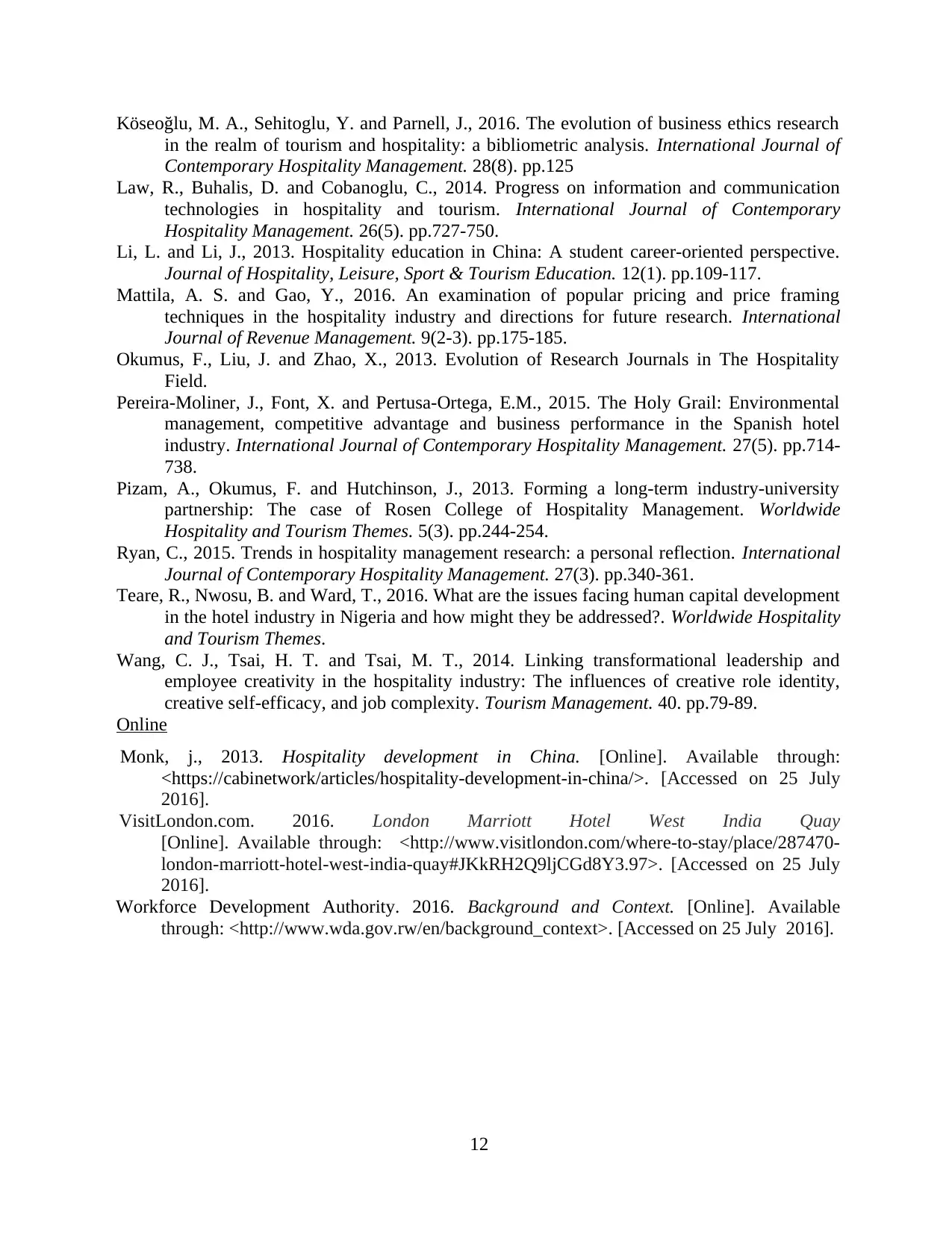
Köseoğlu, M. A., Sehitoglu, Y. and Parnell, J., 2016. The evolution of business ethics research
in the realm of tourism and hospitality: a bibliometric analysis. International Journal of
Contemporary Hospitality Management. 28(8). pp.125
Law, R., Buhalis, D. and Cobanoglu, C., 2014. Progress on information and communication
technologies in hospitality and tourism. International Journal of Contemporary
Hospitality Management. 26(5). pp.727-750.
Li, L. and Li, J., 2013. Hospitality education in China: A student career-oriented perspective.
Journal of Hospitality, Leisure, Sport & Tourism Education. 12(1). pp.109-117.
Mattila, A. S. and Gao, Y., 2016. An examination of popular pricing and price framing
techniques in the hospitality industry and directions for future research. International
Journal of Revenue Management. 9(2-3). pp.175-185.
Okumus, F., Liu, J. and Zhao, X., 2013. Evolution of Research Journals in The Hospitality
Field.
Pereira-Moliner, J., Font, X. and Pertusa-Ortega, E.M., 2015. The Holy Grail: Environmental
management, competitive advantage and business performance in the Spanish hotel
industry. International Journal of Contemporary Hospitality Management. 27(5). pp.714-
738.
Pizam, A., Okumus, F. and Hutchinson, J., 2013. Forming a long-term industry-university
partnership: The case of Rosen College of Hospitality Management. Worldwide
Hospitality and Tourism Themes. 5(3). pp.244-254.
Ryan, C., 2015. Trends in hospitality management research: a personal reflection. International
Journal of Contemporary Hospitality Management. 27(3). pp.340-361.
Teare, R., Nwosu, B. and Ward, T., 2016. What are the issues facing human capital development
in the hotel industry in Nigeria and how might they be addressed?. Worldwide Hospitality
and Tourism Themes.
Wang, C. J., Tsai, H. T. and Tsai, M. T., 2014. Linking transformational leadership and
employee creativity in the hospitality industry: The influences of creative role identity,
creative self-efficacy, and job complexity. Tourism Management. 40. pp.79-89.
Online
Monk, j., 2013. Hospitality development in China. [Online]. Available through:
<https://cabinetwork/articles/hospitality-development-in-china/>. [Accessed on 25 July
2016].
VisitLondon.com. 2016. London Marriott Hotel West India Quay
[Online]. Available through: <http://www.visitlondon.com/where-to-stay/place/287470-
london-marriott-hotel-west-india-quay#JKkRH2Q9ljCGd8Y3.97>. [Accessed on 25 July
2016].
Workforce Development Authority. 2016. Background and Context. [Online]. Available
through: <http://www.wda.gov.rw/en/background_context>. [Accessed on 25 July 2016].
12
in the realm of tourism and hospitality: a bibliometric analysis. International Journal of
Contemporary Hospitality Management. 28(8). pp.125
Law, R., Buhalis, D. and Cobanoglu, C., 2014. Progress on information and communication
technologies in hospitality and tourism. International Journal of Contemporary
Hospitality Management. 26(5). pp.727-750.
Li, L. and Li, J., 2013. Hospitality education in China: A student career-oriented perspective.
Journal of Hospitality, Leisure, Sport & Tourism Education. 12(1). pp.109-117.
Mattila, A. S. and Gao, Y., 2016. An examination of popular pricing and price framing
techniques in the hospitality industry and directions for future research. International
Journal of Revenue Management. 9(2-3). pp.175-185.
Okumus, F., Liu, J. and Zhao, X., 2013. Evolution of Research Journals in The Hospitality
Field.
Pereira-Moliner, J., Font, X. and Pertusa-Ortega, E.M., 2015. The Holy Grail: Environmental
management, competitive advantage and business performance in the Spanish hotel
industry. International Journal of Contemporary Hospitality Management. 27(5). pp.714-
738.
Pizam, A., Okumus, F. and Hutchinson, J., 2013. Forming a long-term industry-university
partnership: The case of Rosen College of Hospitality Management. Worldwide
Hospitality and Tourism Themes. 5(3). pp.244-254.
Ryan, C., 2015. Trends in hospitality management research: a personal reflection. International
Journal of Contemporary Hospitality Management. 27(3). pp.340-361.
Teare, R., Nwosu, B. and Ward, T., 2016. What are the issues facing human capital development
in the hotel industry in Nigeria and how might they be addressed?. Worldwide Hospitality
and Tourism Themes.
Wang, C. J., Tsai, H. T. and Tsai, M. T., 2014. Linking transformational leadership and
employee creativity in the hospitality industry: The influences of creative role identity,
creative self-efficacy, and job complexity. Tourism Management. 40. pp.79-89.
Online
Monk, j., 2013. Hospitality development in China. [Online]. Available through:
<https://cabinetwork/articles/hospitality-development-in-china/>. [Accessed on 25 July
2016].
VisitLondon.com. 2016. London Marriott Hotel West India Quay
[Online]. Available through: <http://www.visitlondon.com/where-to-stay/place/287470-
london-marriott-hotel-west-india-quay#JKkRH2Q9ljCGd8Y3.97>. [Accessed on 25 July
2016].
Workforce Development Authority. 2016. Background and Context. [Online]. Available
through: <http://www.wda.gov.rw/en/background_context>. [Accessed on 25 July 2016].
12
1 out of 14
Related Documents
Your All-in-One AI-Powered Toolkit for Academic Success.
+13062052269
info@desklib.com
Available 24*7 on WhatsApp / Email
![[object Object]](/_next/static/media/star-bottom.7253800d.svg)
Unlock your academic potential
© 2024 | Zucol Services PVT LTD | All rights reserved.





